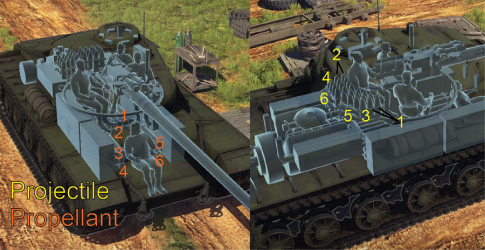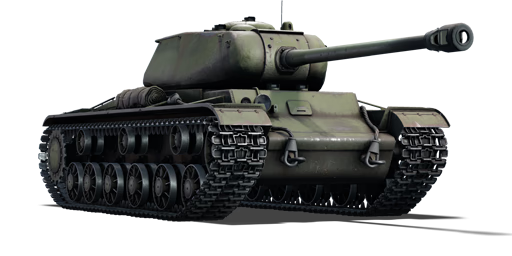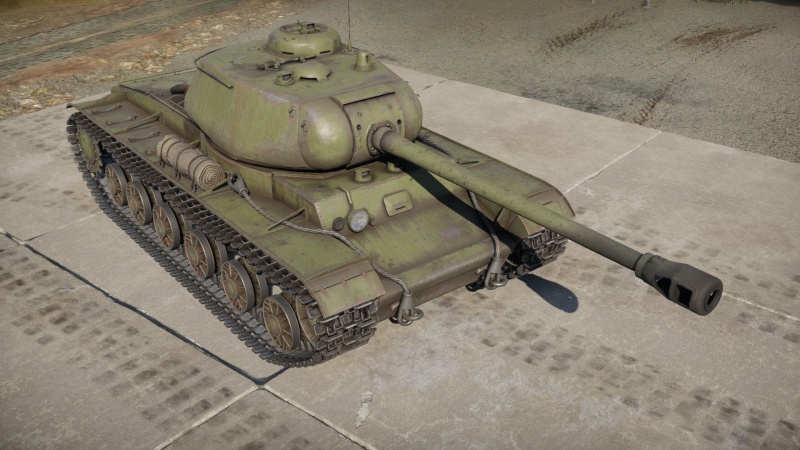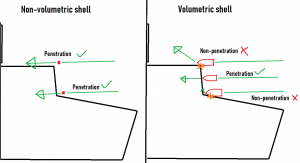Difference between revisions of "KV-122"
Inceptor57 (talk | contribs) m (→Ammunition: Ammunition stat updated in Update "Drone Age") |
(New description format) |
||
| (3 intermediate revisions by 2 users not shown) | |||
| Line 6: | Line 6: | ||
== Description == | == Description == | ||
<!-- ''In the description, the first part should be about the history of the creation and combat usage of the vehicle, as well as its key features. In the second part, tell the reader about the ground vehicle in the game. Insert a screenshot of the vehicle, so that if the novice player does not remember the vehicle by name, he will immediately understand what kind of vehicle the article is talking about.'' --> | <!-- ''In the description, the first part should be about the history of the creation and combat usage of the vehicle, as well as its key features. In the second part, tell the reader about the ground vehicle in the game. Insert a screenshot of the vehicle, so that if the novice player does not remember the vehicle by name, he will immediately understand what kind of vehicle the article is talking about.'' --> | ||
| − | The '''{{Specs|name}}''' | + | The '''{{Specs|name}}''' was a proposed Soviet upgrade to the [[KV-85]], designed with the intent of being able to compete with the firepower and armour of German heavy tanks near the end of World War II. The idea was to equip the existing KV-85s with copies of the turret and gun of the [[IS-2]]. By doing so, the tank would be able to engage German heavy tanks with high effectiveness despite their thick armour. However, the {{Specs|name}} project never progressed beyond a single prototype due to a combination of various factors. Firstly, the Soviet Union had already shifted its focus towards more capable tanks like the IS-2. Secondly, it was deemed unnecessary to recover the relatively small number of KV-85s on the frontlines, upgrade them, and then re-deploy them into combat. And finally, the Soviet Union faced too many logistical challenges to support the production and deployment of the {{Specs|name}} tanks. These challenges included limited resources (caused by a lot of KV-85s being lost), difficulties in transporting the heavy tanks, and a shortage of skilled personnel to operate and maintain them, as those were focused on more advanced tanks. |
| − | The | + | The {{Specs|name}} was introduced in [[Update 1.63 "Desert Hunters"]]. The turret and gun, which are copies of those found on IS-2, are two of its most obvious differences that set it apart from [[KV-1 (Family)|previous models]]. A less noticeable difference is the engine, which was replaced with a V-2IS capable of producing 520 hp as opposed to the V-2K found on most KV variants, which is capable of producing 600 hp. Overall, it plays like an IS-2 with the convenience of a lower battle rating. |
== General info == | == General info == | ||
| Line 77: | Line 77: | ||
==== Ammunition ==== | ==== Ammunition ==== | ||
| − | { | + | {{:D-25T (122 mm)/Ammunition|BR-471, BR-471B, OF-471}} |
| − | |||
| − | |||
| − | |||
| − | |||
| − | |||
| − | |||
| − | |||
| − | |||
| − | | BR-471 | ||
| − | |||
| − | |||
| − | |||
| − | |||
| − | |||
| − | |||
| − | |||
| − | |||
| − | |||
| − | |||
| − | |||
| − | |||
| − | |||
| − | |||
| − | |||
| − | |||
| − | |||
| − | |||
| − | |||
| − | |||
| − | |||
| − | |||
| − | |||
| − | |||
| − | |||
| − | |||
| − | |||
==== [[Ammo racks]] ==== | ==== [[Ammo racks]] ==== | ||
| Line 156: | Line 120: | ||
While this tank is classified as a heavy tank, avoid driving it towards the front lines as the armour is not as strong as your sister heavy tanks and your speed is low as well. Instead, play a support role in backing up your stronger heavy tanks when down-tiered; when up-tiered, you can get away with brawling on the front lines so long as you manage to angle your armour properly. | While this tank is classified as a heavy tank, avoid driving it towards the front lines as the armour is not as strong as your sister heavy tanks and your speed is low as well. Instead, play a support role in backing up your stronger heavy tanks when down-tiered; when up-tiered, you can get away with brawling on the front lines so long as you manage to angle your armour properly. | ||
| − | However, most tanks at the battle rating and above can deal with the KV-122 easily due to the relatively low sloping of the frontal armour. Tanks below | + | However, most tanks at the battle rating and above can deal with the KV-122 easily due to the relatively low sloping of the frontal armour. Tanks below BR 6.0 may be more lenient, although it is unlikely. but tanks with high-velocity anti-tank weapons such as the [[M1 (76 mm)|76 mm gun]] in the U.S., [[Ordnance QF 17-pounder (76 mm)|17-pounder]] in the British, and the [[KwK40 L48 (75 mm)|75 mm KwK40 L48]] in the Germans should be taken with caution. |
[[File:Wsp volumetric shell diagram.png|thumb|Differences between non-volumetric shells and volumetric shells hitting a Tiger I]] | [[File:Wsp volumetric shell diagram.png|thumb|Differences between non-volumetric shells and volumetric shells hitting a Tiger I]] | ||
An important note when engaging tanks, especially Tiger Is, is that, with the implementation of volumetric shells, you can no longer expect your shells to pierce through small openings or right past an obstacle. The large 122 mm calibre of your shells will result in it catching on an armour plate's edge very often, losing all of its penetration. For example, a Tiger I has some edges that can absorb your shell unexpectedly, despite having flat armour. Thus you must always make sure that where you are aiming at is absolutely free of obstruction, or it may result in a non-penetration or a ricochet. This can be seen in the diagram to the right. | An important note when engaging tanks, especially Tiger Is, is that, with the implementation of volumetric shells, you can no longer expect your shells to pierce through small openings or right past an obstacle. The large 122 mm calibre of your shells will result in it catching on an armour plate's edge very often, losing all of its penetration. For example, a Tiger I has some edges that can absorb your shell unexpectedly, despite having flat armour. Thus you must always make sure that where you are aiming at is absolutely free of obstruction, or it may result in a non-penetration or a ricochet. This can be seen in the diagram to the right. | ||
| Line 199: | Line 163: | ||
;Skins | ;Skins | ||
| − | |||
* [https://live.warthunder.com/feed/camouflages/?vehicle=ussr_kv_122 Skins and camouflages for the {{PAGENAME}} from live.warthunder.com.] | * [https://live.warthunder.com/feed/camouflages/?vehicle=ussr_kv_122 Skins and camouflages for the {{PAGENAME}} from live.warthunder.com.] | ||
;Videos | ;Videos | ||
| − | {{Youtube-gallery|FVUuGkSFA4o|''' | + | {{Youtube-gallery|FVUuGkSFA4o|'''KV-122, Soviet, Premium Tier-4, Heavy Tank''' - ''Angry Nerd Gaming''}} |
== See also == | == See also == | ||
Latest revision as of 13:47, 5 August 2023
Contents
Description
The KV-122 was a proposed Soviet upgrade to the KV-85, designed with the intent of being able to compete with the firepower and armour of German heavy tanks near the end of World War II. The idea was to equip the existing KV-85s with copies of the turret and gun of the IS-2. By doing so, the tank would be able to engage German heavy tanks with high effectiveness despite their thick armour. However, the KV-122 project never progressed beyond a single prototype due to a combination of various factors. Firstly, the Soviet Union had already shifted its focus towards more capable tanks like the IS-2. Secondly, it was deemed unnecessary to recover the relatively small number of KV-85s on the frontlines, upgrade them, and then re-deploy them into combat. And finally, the Soviet Union faced too many logistical challenges to support the production and deployment of the KV-122 tanks. These challenges included limited resources (caused by a lot of KV-85s being lost), difficulties in transporting the heavy tanks, and a shortage of skilled personnel to operate and maintain them, as those were focused on more advanced tanks.
The KV-122 was introduced in Update 1.63 "Desert Hunters". The turret and gun, which are copies of those found on IS-2, are two of its most obvious differences that set it apart from previous models. A less noticeable difference is the engine, which was replaced with a V-2IS capable of producing 520 hp as opposed to the V-2K found on most KV variants, which is capable of producing 600 hp. Overall, it plays like an IS-2 with the convenience of a lower battle rating.
General info
Survivability and armour
The armour of the tank at its BR is poor as compared to its lower tier brother the IS-1 which is packing 120 mm of frontal armour. The KV-122 is packing 75, the same as the KV-1. Unlike the IS-1 and IS-2, the KV-122 does not feature the prominent nose that prevents angling allowing a skilled user to angle their armour far above the base value of 75, combined with its 60 mm of side armour and its ability to tank shots while angled is high.
Armour type:
- Rolled homogeneous armour (Hull, Turret roof, Gun mantlet)
- Cast homogeneous armour (Turret, Cupola)
| Armour | Front | Sides | Rear | Roof |
|---|---|---|---|---|
| Hull | 75 mm (30°) Front plate 75 mm (70°) Front glacis 25 mm (25-70°) Joint plate 75 mm (26-75°) Lower glacis |
60 mm 40 mm Turret ring guard |
40 mm (26-79°) Top 75 mm (6-73°) Bottom |
40 mm 30 mm Ports and engine grille |
| Turret | 100 mm (0-72°) Turret front 100 mm (2-58°) Gun mantlet |
100 mm (9-20°) | 100 mm (13-32°) | 30 mm 35 mm Hatches |
| Cupola | 82 mm | 82 mm | 82 mm | 35 mm |
Notes:
- Suspension wheels are 20 mm thick, tracks are 30 mm thick.
- There is a 45 mm thick frame around the gun mantlet. Shots on the border of the mantlet may have this 45 mm be added into the armour calculation.
Mobility
| Game Mode | Max Speed (km/h) | Weight (tons) | Engine power (horsepower) | Power-to-weight ratio (hp/ton) | |||
|---|---|---|---|---|---|---|---|
| Forward | Reverse | Stock | Upgraded | Stock | Upgraded | ||
| Arcade | 37 | 14 | 48 | 671 | 992 | 13.98 | 20.67 |
| Realistic | 35 | 14 | 460 | 520 | 9.58 | 10.83 | |
Mobility wise, the KV-122 is no speed demon, much like the previous KV series of tanks. But for a heavy tank of its size and weight, the KV-122 has a decent on-road speed of around 40 km/h, allowing to keep up with some medium tanks. It also has a pretty fast reverse speed of -14 km/h, meaning it can quickly retreat to safety if the player misses a shot or gets hit.
However, the KV-122 becomes quite sluggish and struggles to drive on muddy, snowy or sandy surfaces, giving it a very poor off-road mobility. Moreover, the poor power to weight ratio makes it more sluggish to move around on a slope, or to accelerate on road. It is also bad at traversing the hull, the tracks are long and quite narrow, making the hull to turn really slow, therefore a short forward/backward acceleration is often needed to quickly turn the hull. The KV-122 feels slow especially when compared to the faster IS-2.
Modifications and economy
Armaments
Main armament
The KV-122 packs the same 122 mm gun as the IS-2, thus suffers the same advantages and draw backs as her sister vehicle. The advantage is a weapon with acceptable penetration and the nearly guaranteed one shot potential of the 122. The draw backs consist of the lengthy reload in between shots, which would leave the vehicle extremely vulnerable. The ammunition types are also the same as the IS-2 and as a result, your load out should be the same. Your default shell is strong and you should carry it primarily for the most part. The KV-122 does not need to struggle much to penetrate most targets from 4.7-5.7; but at 6.7 or higher, you might want to use the APHEBC, which has slightly higher penetration.
| 122 mm D-25T | Turret rotation speed (°/s) | Reloading rate (seconds) | |||||||||||
|---|---|---|---|---|---|---|---|---|---|---|---|---|---|
| Mode | Capacity | Vertical | Horizontal | Stabilizer | Stock | Upgraded | Full | Expert | Aced | Stock | Full | Expert | Aced |
| Arcade | 28 | -3°/+20° | ±180° | N/A | 11.33 | 15.68 | 19.04 | 21.06 | 22.40 | 27.04 | 23.92 | 22.05 | 20.80 |
| Realistic | 8.33 | 9.80 | 11.90 | 13.16 | 14.00 | ||||||||
Ammunition
| Penetration statistics | |||||||
|---|---|---|---|---|---|---|---|
| Ammunition | Type of warhead |
Penetration @ 0° Angle of Attack (mm) | |||||
| 10 m | 100 m | 500 m | 1,000 m | 1,500 m | 2,000 m | ||
| BR-471 | APHE | 205 | 201 | 182 | 161 | 143 | 127 |
| BR-471B | APHEBC | 205 | 203 | 192 | 178 | 166 | 155 |
| OF-471 | HE | 37 | 37 | 37 | 37 | 37 | 37 |
| Shell details | ||||||||||||
|---|---|---|---|---|---|---|---|---|---|---|---|---|
| Ammunition | Type of warhead |
Velocity (m/s) |
Projectile mass (kg) |
Fuse delay (m) |
Fuse sensitivity (mm) |
Explosive mass (TNT equivalent) (g) |
Ricochet | |||||
| 0% | 50% | 100% | ||||||||||
| BR-471 | APHE | 795 | 25 | 1.2 | 19 | 246.4 | 47° | 60° | 65° | |||
| BR-471B | APHEBC | 795 | 25 | 1.2 | 19 | 246.4 | 48° | 63° | 71° | |||
| OF-471 | HE | 795 | 25 | 0 | 0.1 | 3,600 | 79° | 80° | 81° | |||
Ammo racks

| Full ammo |
Ammo part |
1st rack empty |
2nd rack empty |
3rd rack empty |
4th rack empty |
5th rack empty |
6th rack empty |
Visual discrepancy |
|---|---|---|---|---|---|---|---|---|
| 28 | Projectiles Propellants |
21 (+7) 21 (+7) |
13 (+15) 13 (+15) |
9 (+19) 9 (+19) |
5 (+23) 7 (+21) |
3 (+25) 3 (+25) |
1 (+27) 1 (+27) |
No |
Note:
- Turret minimum: 13 (+15) shells.
Machine guns
| 7.62 mm DT | ||||
|---|---|---|---|---|
| Mount | Capacity (Belt) | Fire rate | Vertical | Horizontal |
| Coaxial | 1,890 (63) | 600 | N/A | N/A |
Usage in battles
While this tank is classified as a heavy tank, avoid driving it towards the front lines as the armour is not as strong as your sister heavy tanks and your speed is low as well. Instead, play a support role in backing up your stronger heavy tanks when down-tiered; when up-tiered, you can get away with brawling on the front lines so long as you manage to angle your armour properly.
However, most tanks at the battle rating and above can deal with the KV-122 easily due to the relatively low sloping of the frontal armour. Tanks below BR 6.0 may be more lenient, although it is unlikely. but tanks with high-velocity anti-tank weapons such as the 76 mm gun in the U.S., 17-pounder in the British, and the 75 mm KwK40 L48 in the Germans should be taken with caution.
An important note when engaging tanks, especially Tiger Is, is that, with the implementation of volumetric shells, you can no longer expect your shells to pierce through small openings or right past an obstacle. The large 122 mm calibre of your shells will result in it catching on an armour plate's edge very often, losing all of its penetration. For example, a Tiger I has some edges that can absorb your shell unexpectedly, despite having flat armour. Thus you must always make sure that where you are aiming at is absolutely free of obstruction, or it may result in a non-penetration or a ricochet. This can be seen in the diagram to the right.
Pros and cons
Pros:
- Excellent firepower with nearly unmatched destructive potential
- High penetration allows it to easily kill higher BR tanks (e.g. Jagdpanther, early Centurion)
- Considerably good speed for a heavy tank: around 40 km/h on road
- Easy to angle front armour (no shot trap like the IS-1 or 2)
- Good reverse speed allows it to retreat quickly
- Turret armour can sometimes bounce/absorb shells
- Side armour is quite thick, allowing "side scraping"
- Has a low profile for a heavy tank
Cons:
- Very low rate of fire demanding every shot to count
- Inadequate frontal and overall armour for a heavy tank
- Cramped interior often leads to all crew getting knocked out with one shot
- Sluggish compared to the IS series
- Extremely poor gun depression
- Slow turret traverse speed
History
It was 1944, the end of World War II felt close, yet there were many kilometres on the way into Germany. The Soviet forces were amidst a complete counteroffensive into previously German-controlled countries in Eastern Europe. The Axis forces were on a full defensive retreat.
The battles, however, only seemed more ferocious. Bigger and better-armed heavier tanks like the IS-2 were preparing, with the purpose of charging and spearheading massive assaults over city streets, farm fields, and extensive forests, where fearsome enemies like the Tiger, Ferdinand/Elefants and Panther could be encountered. The threat of heavy anti-tank emplacements such as the 8.8 cm Pak 43 and the 12.8 cm Pak 44 was also high.
One of those proposed tanks to be built was the KV-122. The tank was based on a KV-85 chassis and featured a new 122 mm D-25T gun and turret, borrowed from the IS-2. The design bureau assigned to build the single prototype was the Chelyabinsk Tractor Plant, lead by the engineer Abram Samuilovich Shneidman. The premise was to refit the numerously available KV chassis and extend their combat capacities. The idea proved competent for a test since it only needed a few modifications; the gun, the engine and the turret. The most important modification was with no doubt the firepower. It was a significant increase when compared to the previous KV family. This refit would deem not necessary to build a whole new tank. Instead, this modification to the existing KV-85s would have provided a remarkable update in firepower.
Ultimately, the idea didn't progress as it was considered unnecessary to retrieve the rather small numbers of KV-85s in frontline service, upgrade them and send them back. The outdated hull armour of the KV was also considered ineffective against the highly capable German guns.
Only a single KV-122 prototype was ever built. The war efforts were instead put into the all-around stronger and powerful tank; the IS-2.
Media
- Skins
- Videos
See also
- Vehicles equipped with the same chassis
External links
| Chelyabinsk Tractor Plant (Челябинский тракторный завод) | |
|---|---|
| IFVs | |
| BMP-1 | BMP-1 |
| Heavy Tanks | |
| KV | KV-85 · KV-122 |
| IS-1/2 | IS-1 · IS-2 · IS-2 (1944) · IS-2 "Revenge" · IS-2 No.321 |
| T-10 | T-10A · T-10M |
| Other IS Tanks | IS-3 · IS-4M |
| Tank Destroyers | |
| KV Derivatives | SU-152 |
| IS Derivatives | ISU-152 · ISU-122 · ISU-122S · Object 268 |
| Export | |
| IS-2 | ␗IS-2 · IS-2 No.402 · ␗IS-2 (1944) |
| ISU | ␗ISU-152 · ␗ISU-122 |
| IFVs | SPz BMP-1 |
| See Also | Leningrad Kirov Plant |
| USSR heavy tanks | |
|---|---|
| KV-1 | KV-1 (L-11) · KV-1 (ZiS-5) · KV-1E · KV-1S |
| KV-2 | KV-2 (1939) · KV-2 (1940) · KV-2 (ZiS-6) |
| Other KVs | KV-85 · KV-122 · KV-220 |
| IS-1/2 | IS-1 · IS-2 · IS-2 (1944) · IS-2 No.321 · IS-2 "Revenge" · Object 248 |
| Other IS tanks | IS-3 · IS-4M · IS-6 · IS-7 |
| T-10 | T-10A · T-10M |
| Multi-turreted | T-35 · SMK |
| Other | Object 279 |
| Lend-Lease | ▂MK-II "Matilda" |
| USSR premium ground vehicles | |
|---|---|
| Light tanks | BA-11 · RBT-5 · BT-7A (F-32) · T-26 (1st Gv.T.Br.) · T-26E · T-126 · PT-76-57 · 2S38 |
| Medium tanks | T-34 (Prototype) · T-34 (1st Gv.T.Br.) · T-34E · T-34-57 (1943) · T-34-85E · T-34-100 · T-44-122 · TO-55 · T-55AM-1 · T-72AV (TURMS-T) · T-80UD · Т-80U-Е1 |
| ▂M3 Medium · ▂M4A2 · ▂T-III · ▂T-V · ▂МК-IX "Valentine" | |
| Heavy tanks | SMK · T-35 · ▂MK-II "Matilda" · KV-1E · KV-2 (1940) · KV-2 (ZiS-6) · KV-122 · KV-220 · IS-2 "Revenge" · Object 248 · IS-6 · T-10A |
| Tank destroyers | BM-8-24 · BM-13N · BM-31-12 |
| SU-57 · SU-76D · SU-76M (5th Gv.Kav.Corps) · SU-85A · SU-100Y · SU-122P · Object 120 | |
| SPAA | ▂Phòng không T-34 · ZUT-37 |






